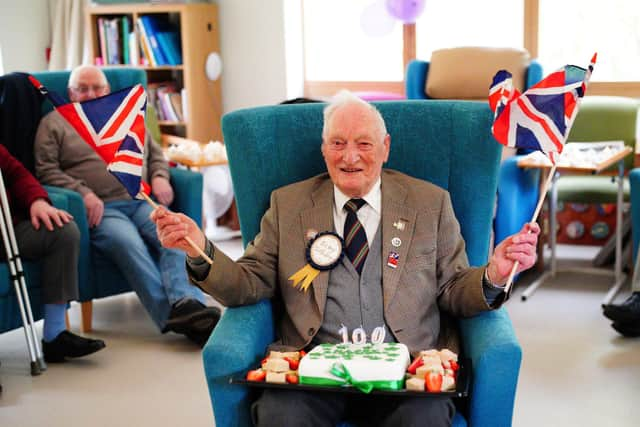Retired RAF Squadron Leader celebrates 100 years of his 'good life'
and live on Freeview channel 276
A party was held for Derrick Grubb, of Havant, on Monday by the Veterans Group which meets at the Rowans Hospice's Living Well Centre in Waterlooville, to mark his milestone birthday. Mr Grubb joined the RAF in July 1942 and served with the 112 Squadron, one of the first squadrons to receive the Curtiss P40 Kittyhawk fighter bomber.
While based in Italy in 1943, he was shot down and captured as a prisoner of war and held for a year before he was forced to march hundreds of miles westwards as the German army retreated at the end of the war. Mr Grubb, who served in the RAF for 34 years, went on to write a book about his experiences and to educate his grandchildren.
Advertisement
Hide AdAdvertisement
Hide AdWhen asked about the secret of his long life, Mr Grubb, whose birthday was on April 12, told the PA news agency: "I don't know, I've had a good life, I haven't had any bad ills in my life and I haven't been in hospital apart from a minor operation and I was only there two days. I've thoroughly enjoyed my service life, I enjoyed it so much I wrote a book about it.


"I trained as a pilot and got shot down in operations over Italy and spent a year in a prisoner of war camp and when I came back, they asked me what I wanted to do, I said 'fly'. So I signed up for four years and during those four years they asked me if I wanted to be commissioned and I served all in all for 34 years. It was all so enjoyable I wrote about my life in the air force."
Explaining why it was still important to commemorate the war, he added: "It's a sad time but it's something to be remembered and I am sure we will always remember it because it's a damn good job it was finished. At the time, as a young man of 18 when I joined up, everything was so new, I hadn't been out of the country before, going to South Africa, on a train for two days going up to Rhodesia, Zimbabwe now, trained as a pilot there then went up to the Middle East and Italy and then I got shot down.
"It was an adventure for an 18-year-old boy at the time and that's how you looked upon it and the same with the POW camp and the long march but it is when you get to this age and you think about it, it was all terrible, it shouldn't have been there, it had to be done. I was happy I was there. If I had the chance again, I would go only because it affected us so much and if they had overrun us like they did the other countries and treated us like the others... it should never be done again."